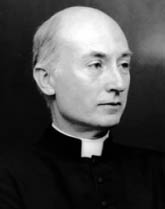 Since I am slowly introducing members of my community of the heart, today seems a particularly good day to introduce a man who, like St. Therese of Lisieux, needs no introduction. His name is Eric Blair, but he is known to the world as George Orwell. It was while reading Orwell that I really came to consciousness as a young teenager. As a high school sophomore I read Orwell's A Hanging. As with many essays, novels, poems, musical compositions, paintings, and people who have deeply influenced me, it is difficult to describe completely the effect this essay against capital punishment had on me. I can write that through this essay I came face-to-face with human mortality, my own mortality. In a flash the awful (meaning full of awe), mysterious, incomprehensible beauty and preciousness of human life became apparent to me. All of this was quite existential, as opposed to transcendental. From this flash, or satori-like realization, I was led to another member of my personal community, a man whose writings I devoted a lot of time and energy to during college in coursework both in Philosophy and History, Albert Camus. In my senior seminar for History, I studied the Algerian war of independence in great detail. This is relevant because Camus was a pied noir, a French Algerian. Therefore, my Senior Thesis for History was Camus' response to the Algerian war of independence, about which he was ambivalent. I will write more about Camus another time.
Since I am slowly introducing members of my community of the heart, today seems a particularly good day to introduce a man who, like St. Therese of Lisieux, needs no introduction. His name is Eric Blair, but he is known to the world as George Orwell. It was while reading Orwell that I really came to consciousness as a young teenager. As a high school sophomore I read Orwell's A Hanging. As with many essays, novels, poems, musical compositions, paintings, and people who have deeply influenced me, it is difficult to describe completely the effect this essay against capital punishment had on me. I can write that through this essay I came face-to-face with human mortality, my own mortality. In a flash the awful (meaning full of awe), mysterious, incomprehensible beauty and preciousness of human life became apparent to me. All of this was quite existential, as opposed to transcendental. From this flash, or satori-like realization, I was led to another member of my personal community, a man whose writings I devoted a lot of time and energy to during college in coursework both in Philosophy and History, Albert Camus. In my senior seminar for History, I studied the Algerian war of independence in great detail. This is relevant because Camus was a pied noir, a French Algerian. Therefore, my Senior Thesis for History was Camus' response to the Algerian war of independence, about which he was ambivalent. I will write more about Camus another time.So taken was I with George Orwell that I penned a few articles for high school publications using the pseudonym Eric Blair, which I thought extraordinarily clever at sixteen. Orwell is on my mind today because of a posting by Fr. George Rutler, who I also admire a great deal, on the First Things blog about the ever-increasing demolition, or deconstruction, of language and why it matters. Back in August I posted a more technically philosophical treatment of this same theme in What's in a name? An observation of some societal consequences of Philosophical Nominalism. In his post, Fr. Rutler draws heavily from Orwell's still relevant Politics and the English Language. He uses this classic Orwell analogy: "A man may take to drink because he feels himself to be a failure, and then fail all the more completely because he drinks. It is rather the same thing that is happening to the English language." In his own books, Fr. Rutler writes brilliantly about our culture and the perils we face. His book A Crisis of Saints: Essays on People and Principles is well worth taking the time to read. In the opening pages he writes:

"A tendency to unreality, or psychological denial, is the poison of any culture that has calculated its agenda apart from the intense realism typical of saints. The poison has an antidote, however bitter it may taste to the lethargic. It has three ingredients. Saint Francis de Sales wrote of them, but the benign alchemy was summed up before him by Louis of Granada. These are regular prayer (neglect of which destroys the taste for the things of God); contempt for inordinate self-love (which prevents loss of the right perspective on the self and everything outside the self); and the cultivation of those virtues proper to one's state of life (lest the devil of distraction dissipate energy)." Emphasis mine.
The intense realism typical of saints is a phrase that is so accurate and deep that it can easily serve as a point of departure for meditation. In short, Fr. Rutler is a man who knows how to use the English language and understands, as a pastor of souls (he is pastor of the Church of Our Saviour in New York City), why it matters.
 As to Orwell's continuing relevance, I highly recommend Christopher Hitchens' Why Orwell Matters. Christopher is the agnostic Hitchens. Whereas, his brother, Peter, also a popular writer in the U.K., is a very devout Anglican (guess who is who in the photo). Anyway, for those interested here is a link to an odd exchange between the brothers Hitchens in the U.K.'s Guardian newspaper from May, 2005.
As to Orwell's continuing relevance, I highly recommend Christopher Hitchens' Why Orwell Matters. Christopher is the agnostic Hitchens. Whereas, his brother, Peter, also a popular writer in the U.K., is a very devout Anglican (guess who is who in the photo). Anyway, for those interested here is a link to an odd exchange between the brothers Hitchens in the U.K.'s Guardian newspaper from May, 2005.


No comments:
Post a Comment